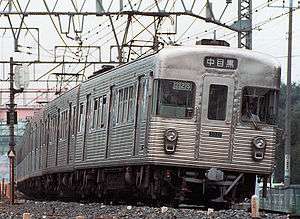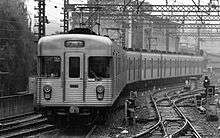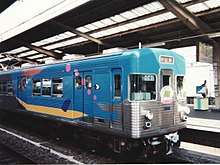TRTA 3000 series
| TRTA 3000 series | |
|---|---|
 TRTA 3000 series set 3021 on the Tobu Isesaki Line in 1988 | |
| In service | 1961–July 1994 |
| Constructed | 1960–1970 |
| Number built | 304 vehicles (38 sets) |
| Formation | 2/4/6/8 cars per trainset |
| Fleet numbers | 3001–3574 |
| Operator(s) | TRTA |
| Line(s) served | TRTA Hibiya Line, Tokyu Toyoko Line, Tobu Isesaki Line |
| Specifications | |
| Car body construction | Stainless steel |
| Car length | 18,000 mm (59 ft 1 in) |
| Width | 2,790 mm (9 ft 2 in) |
| Height | 3,995 mm (13 ft 1.3 in) |
| Doors | 3 pairs per side |
| Maximum speed | 100 km/h (60 mph) |
| Acceleration | 4.0 km/h/s |
| Deceleration |
4.0 km/h/s (service) 5.0 km/h/s (emergency) |
| Electric system(s) | 1,500 V DC |
| Current collection method | Overhead catenary |
| Safety system(s) | Tobu ATS, Tokyu ATS, WS-ATC (ATO) |
| Track gauge | 1,067 mm (3 ft 6 in) |
The TRTA 3000 series (営団3000系 Eidan 3000-kei) was an electric multiple unit (EMU) train type operated by TRTA (present-day Tokyo Metro) on the then TRTA Hibiya Line from 1961 to 1994.
Operations
This train was fitted with safety systems compatible with the Tokyu Toyoko Line and Tobu Isesaki Line. This train was also compatible with driverless operation on the Hibiya Line section experimented starting from February 1962 by retrofitting car no. 3015 with autopilot equipment and was extended to the entire Hibiya Line by October 1970, with two additional cars, numbers 3057 and 3035 retrofitted with autopilot equipment in January and November 1963. The autopilot trials were stopped by 1987, and despite the autopilot equipment occupying a large space in these three cars these experiments subsequently became the basis of operating the Namboku Line in driverless mode. The 3000 series ran as full 8-car sets.
Formations

The first 3000 series trains were built as two-car sets, but the fleet was gradually lengthened to four-car, six-car, and finally eight-car formations, as shown below.[1]
March 1961 -
| Designation | CM1 | CM2 |
|---|---|---|
| Numbering | 3000 | 3000 |
May 1962 -
| Designation | CM1 | M2 | M1 | CM2 |
|---|---|---|---|---|
| Numbering | 3000 | 4000 | 4000 | 3000 |
August 1964 -
| Designation | CM1 | M2 | M1 | M2 | M1 | CM2 |
|---|---|---|---|---|---|---|
| Numbering | 3000 | 4000 | 4500 | 4500 | 4000 | 3000 |
May 1971 - 1994
| Designation | CM1 | M2 | M1 | Mc2 | Mc1 | M2 | M1 | CM2 |
|---|---|---|---|---|---|---|---|---|
| Numbering | 3000 | 4000 | 4500 | 3500 | 3500 | 4500 | 4000 | 3000 |
The Mc cars had small driving cabs for use in depot shunting.[1]
History

The 3000 series trains were gradually phased out from 1988 following the introduction of new 03 series EMUs. The last sets ran in revenue service on 22 July 1994, with a special "sayonara" run for rail enthusiasts on the following day using set 3055, specially decorated in a "whale" colour scheme and carrying a "Sayonara 3000 series" headboard.[2]
Resale
Some trains were sold to the Nagano Electric Railway where they operate as three-car sets reclassified as 3500 and 3600 series.[2]
 A Nagano Electric Railway 3500 series set in November 2010
A Nagano Electric Railway 3500 series set in November 2010
Pantographs and traction motors from withdrawn 3000 series cars were also reclaimed for use on Choshi Electric Railway 1000 series electric cars.[3]
Preserved examples
Two cars, 3001 and 3002, were returned to Tokyo Metro's Ayase Depot in 2007 following their withdrawal from service on the Nagano Electric Railway.[4] The two cars were moved to Senju Depot in 2015 where they are undergoing further renovation.[4]
- Driver's cab of preserved car 3001 in November 2010
- Preserved 3000 series cars 3001 and 3002 at Ayase Depot in December 2007
See also
References
| Wikimedia Commons has media related to TRTA 3000 series. |
- 1 2 Miura, Mamoru (January 2016). 日比谷線車両の移り変わり. Japan Railfan Magazine (in Japanese). Vol. 56 no. 657. Japan: Koyusha Co., Ltd. pp. 103–108.
- 1 2 "営団地下鉄3000系さよなら運転" [TRTA 3000 series final run]. The Railway Pictorial. 44 (596): 77. October 1994.
- ↑ Shirato, Sadao (July 2011). 銚子電気鉄道下 銚子電気鉄道(下) [Choshi Electric Railway Volume Two]. Japan: Neko Publishing Co., Ltd. p. 42. ISBN 978-4-7770-5310-0.
- 1 2 Shibata, Togo (March 2017). 非公開の保存車両に注目 [Looking at rolling stock preserved in private]. Tetsudo Daiya Joho Magazine (in Japanese). Vol. 46 no. 395. Japan: Kotsu Shimbun. p. 59.
